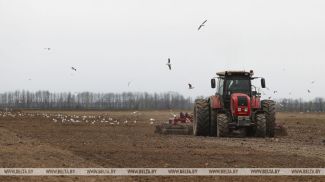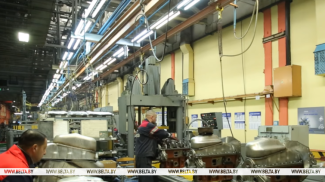MINSK, 5 December (BelTA) - Belarus is considering joining the International Federation of Organic Agriculture Movements (IFOAM), Belarus Deputy Agriculture and Food Minister Vladimir Grakun said at a press conference in BelTA's press center.
“We are considering joining the IFOAM. This will facilitate the recognition of our certificates in the world. We are interested in exporting organic products and for this we need our certificates to be recognized. We have been working to unify the information on organic products in accordance with the European requirements to be able to supply our products to the EAEU markets and to the European market,” Vladimir Grakun said.
When asked about plans to deliver Belarusian organic products to China, Vladimir Grakun replied: “Exports will depend on demand. We are ready to do so on the request of China. But here we need to discuss what products and what volumes China might be interested in, what the requirements in the Chinese market are. The law on organic products comes into effect in Belarus in a year. So there is time to discuss things.”
According to the law, the production and turnover of organic products will be financed by manufacturers, through national and local budgets under government programs and other sources not prohibited by the legislation. “Today manufacturers produce mainly organic vegetables, cereal crops. The state agrarian business program for 2016-2020 is currently in effect in Belarus. It has a subprogram which provides for the allocation of funds, on a competitive basis, to plant orchards, to build storage facilities,” the deputy minister said.
Organic farming provides a number of additional opportunities for environmental, economic and social benefits, noted Andrei Kuzmich, the deputy head of the biological and landscape diversity department of the waste management, biological and landscape diversity directorate at the Ministry of Natural Resources and Environmental Protection. Organic farming, when properly organized, helps improve the state of the environment, reduce emissions of man-made chemicals into the soil, ground waters and surface waters. The law on organic farming which prohibits the use of chemical fertilizers, plant protection products, and other chemicals in the production of organic products will help make progress in the area,” Andrei Kuzmich said.
The Belarusian National Strategy for Sustainable Social and Economic Development through 2030 provides for an increase in the share of organic land in the total farming area to 3-4% by 2030 as one of the main criteria to boost agricultural development. Belarus Food Security Doctrine through 2030 also contains the provisions on the need to develop organic farming.
More than 20 economic entities of Belarus are engaged in organic farming. They include farms and private plots, agricultural and other organizations of Brest Oblast, Vitebsk Oblast, Grodno Oblast, Minsk Oblast and Mogilev Oblast. Seven organizations have been accredited in the European Union to issue certificates on organic farming. Some 1,500 hectares of farming land has been certified as organic.
The International Federation of the Organic Agricultural Movements (IFOAM) includes about 760 organizations and associations from more than 100 countries. The total area of land certified for organic farming has increased from 30 million to 58 million hectares in the past 10 years. The sales of organic products on the world market have increased 2.3 times, up to $90 billion. This market grows by 10-20% on an annual basis. According to expert estimate, the international trade of organic products will hit $130 billion by 2020.











